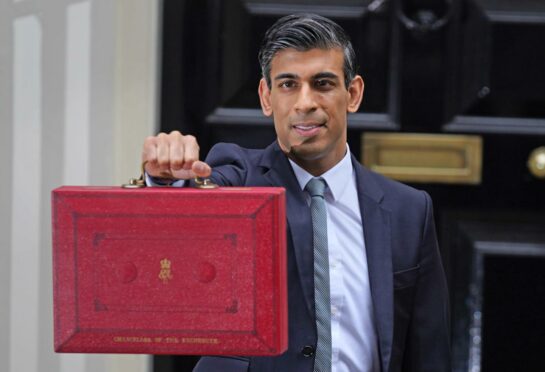Business groups in Scotland welcomed the budget but highlighted the “slim pickings” available to aid economic recovery as the Chancellor’s plans often fell short of expectations.
Dr Liz Cameron, chief executive of the Scottish Chambers of Commerce (SCC), said there were some aspects of the budget and spending review that “go some way towards securing the economic growth and conditions businesses need to bounce back from the devastating impact of the last 18 months due to Brexit and the global pandemic”.
“However,” she added, “businesses are asking whether this budget goes far enough to tackle the significant issues facing them and whether it aligns with the economic realities on the ground, where supply chain problems, skills shortages and rising cost pressures are undermining growth.”
Inflation, inflation, inflation
The Office for Budget Responsibility (OBR) published alongside the Treasury’s spending review revealed pain in store for household and public finances from soaring inflation, with the latest prediction showing the rate of consumer prices index (CPI) is set to jump from 3.1% to an average of 4% over 2022.
Ms Cameron said the rise would make businesses facing cost pressures “uneasy”.
She said: “Businesses across Scotland have reported record high levels of concern over inflation and taxation, which is impacting on investment.
“Surges in the cost of raw materials and shipping, global supply chain disruption and the UK Government’s decision to raise National Insurance contributions, are all being cited by firms as key factors behind rising costs which still need addressed.
“It’s important the UK Government and the Bank of England work to get inflation under control, help businesses repair those broken or damaged supply chains and deliver the opportunity for firms to attract the talent and skills they need into the workforce, otherwise this will eventually lead to increased costs being passed on to consumers.”
Talent shortage crisis
She added that the introduction of a “scale-up visa” to allow employers to more easily recruit highly skilled foreigners was positive but not enough to fix workforce shortages.
“There are record high vacancies in Scotland as businesses struggle to recruit staff in an increasingly competitive labour market,” she said.
“The injection of money into training and skills, coupled with the introduction of the scale-up visa, which will launch in spring 2022, will help Scotland’s fastest-growing businesses to access overseas talent.
“Regrettably, many businesses will not feel this goes far enough, fast enough.
“Scottish industry needs a UK immigration policy which better aligns with the economic needs of the whole of the UK and one which is agile enough to fill the immediate gaps that exist in the labour market, otherwise there is a real risk of stifling economic recovery.”
Tracy Black, CBI Scotland director, said the Chancellor had shown a “genuine willingness to listen to business” with support for innovation and economic growth but that it left “more to be done” to deliver the “high investment, high productivity economy the country needs”.
“The Government’s commitment to innovation will be central to efforts to build and sustain the industries of the future.
“This will be essential to be globally competitive so the Government must stick to these targets in the coming years.”
Andrew McRae, FSB’s Scotland policy chair, said there were “slim pickings for hard-pressed debt-laden Scottish small businesses” in the budget.
He said: “The Chancellor could have reduced payroll taxes or taken the edge off non-domestic energy bills.
“However, Scotland’s local and independent firms struggling under the weight of Covid debt and spiralling utility costs won’t have heard much from the Chancellor that will help them balance the books.”
Business bank funding support revealed
Catherine Lewis La Torre, chief executive of the British Business Bank, was in a more positive mood having welcomed a £150 million fund dedicated to supporting smaller businesses in Scotland.
She said: “The package the Chancellor has announced today enables us to build on our range of programmes to support sustainable economic growth by increasing the supply, diversity and demand for finance for UK smaller businesses.
“This includes delivering a new £150m fund dedicated to supporting smaller businesses in Scotland, building on what is already a strong infrastructure, particularly in the provision of equity for high-growth businesses.
“We look forward to working with Scottish Enterprise, the Scottish National Investment Bank and local stakeholders to deliver this increased support.
Deirdre Michie, chief executive of oil and gas industry trade body, OGUK, may have had cause to feel left out of the budget’s array of announcements, without any mention or support for the industry on offer. In a statement, she reminded the Treasury how member companies continue to play a “central role” supporting the UK’s post-Covid recovery.
She said: “Throughout the pandemic, UK offshore oil and gas employees helped keep homes and hospitals powered, and the whole country functioning.
“Now our sector has a crucial role to play in supporting the country in its post-Covid recovery, generating affordable low carbon energy and supporting the delivery of the country’s climate ambitions.
“We are also focused on accelerating the homegrown greener energies like wind, hydrogen and carbon capture that will get us there, with the generation of low carbon energy jobs for our skilled workforce to deliver them.”




